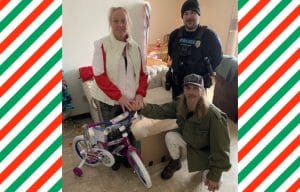Local pastor looks back on time in the Ukraine
The Ukraine has been on the world’s radar as a conflict-torn country for nearly a year and shows no signs of slowing down.
Last fall, the Ukrainian government decided not to sign the agreement with the European Union, and conflict has ensued since then.
The people of the country have seen corruption, demonstrations and uprising in the southern and eastern regions of the Ukraine.
The United Nations reports that at least 3,000 people have been killed and more than 5,000 wounded in eastern Ukraine since mid-April.
The conflict in this nation hits close to home for one Waterloo resident and his family: Pastor Bill Thomas of Concord Presbyterian Church.
Thomas and his family moved to western Ukraine in 1996, where they lived in the city of L’viv, about 800 miles away from the now-troubled area of Donetsk.
“We had done some summer ministry there previously and felt like God wanted us to move there and stay put for a while,” he said.
Thomas calls western Ukraine the more “nationalistic” part of the country, where the majority of the region’s people speak Ukrainian.
“Part of the issue going on now is the supposed conflict between Russian and Ukrainian speakers,” he said.
L’viv used to be Polish and is a city of about 1 million people.
They were in L’viv for 12 years.
“What we thought would be three to five years turned into more,” he said. “We originally went over to work with athletes as part Athletes in Action, the sports ministry of Campus Crusade for Christ.”
He said the need grew in western Ukraine after they spent a few summers there, and Thomas and his wife made the decision to move with their 1-year-old and 3-year-old.
“We started language study first,” he said. “Then we started seeing that the needs around us were just so great for families. It was a much greater need than sports ministry.”
They switched gears about their fifth year and turned to family ministry.
In addition to helping local families while they were there, the Thomases adopted two children as well.
“Our family is a mixture of Ukrainian kids and natural-born kids,” he said. “But even one of our natural-born kids was born in Hungary.”
When they first got to the Ukraine, Thomas and his wife couldn’t quite figure out if what they were seeing was true city life, or post-communism city life.
The Ukraine became independent in 1992, just a short time before the Thomases began their ministry.
“We were beginning to see what the fall-out of a post-Soviet government looked like,” he said. “Even just seeing poverty and people begging on the street… We weren’t sure how much of that was normal city life and how much of that was the result of the drastic change in economy.”
Thomas describes watching the Ukraine “grow up” into the “teenager stage,” where the nation wanted all the rights and privileges of being an independent country, but not the responsibilities.
“The systemic corruption is really what has just derailed and made their steps towards normal democracy and independence be very slow and painful,” he said.
Thomas said their family saw a lot of Western technology coming in, but the bones of society were still very much post-Soviet.
“It wasn’t easy to get things done (as a minister),” he said.
However, Thomas said one of the most rewarding things about their time in the Ukraine was the freedom to talk about Christianity in the classroom.
“There was a renewed hunger to know what is true and to appreciate the freedom,” he said. “Here, we get into the politics behind the separation of church and state, but over there, it was an opportunity for the students to finally hear some things that hadn’t been allowed as freely before.”
Seeing this new wave of Christian ministry was a real highlight for Thomas.
The hardest part of living in the Ukraine was trying to navigate the corruption in society.
“Seeing people with very minimal resources trying to make ends meet and being held for ransom by a corrupt system (was very hard),” he said. “Wanting to do good and having to fight against a whole system was not easy.”
Thomas said their time in the Ukraine, however, was good for them as a family.
“The pace of life is so different in the United States,” he said. “We thought we’d never run the rat race, but we’re back in the stream of what’s going on around us.”
He said growing up in a different society helped his kids become more cultured, even though they were fairly young.
“Their lenses are definitely wider,” he said. “They’re not as ethno-centric, as many people from their own culture are, whether it’s American culture or otherwise.”
They came back to the U.S. and moved to Dallas, where Thomas was in the seminary for three years.
“Going from the Ukraine to Dallas was quite a shift,” he said. “Leaving your country and moving overseas is one transition, and then you think you’re coming back to a life you understand, but you really don’t. It’s like reverse culture shock.”
The Thomases have been in Waterloo for the past three years after they moved from Dallas.
“We watch (the conflict) and we pray,” he said. “It’s been hard, but it’s been good to see the church ministries (in the Ukraine) rise up and be what they’re supposed to be.”






